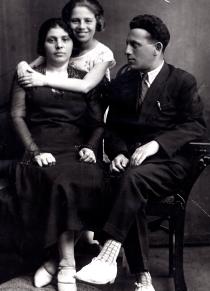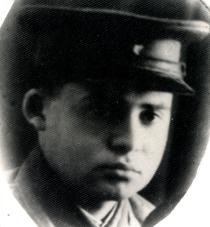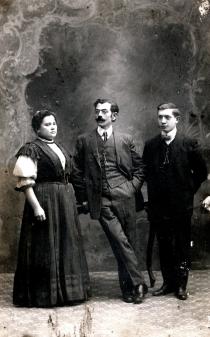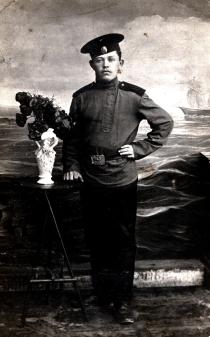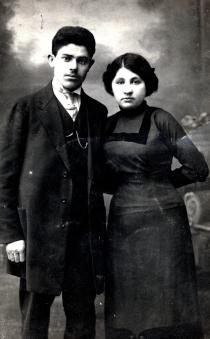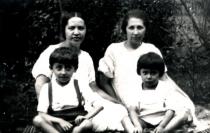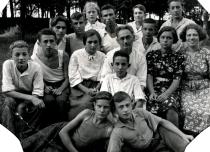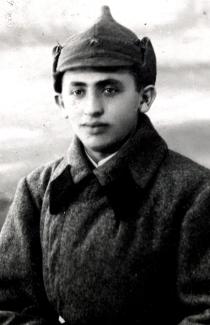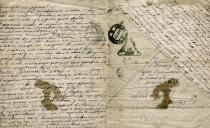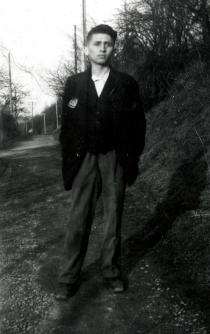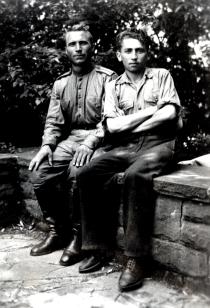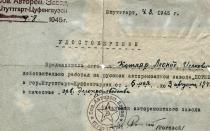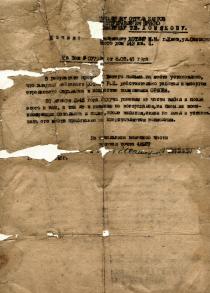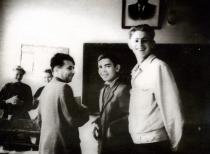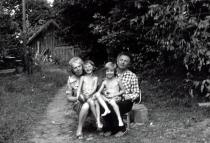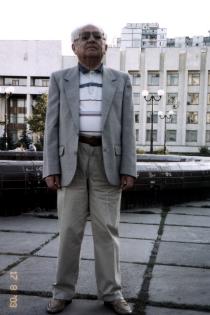The last peaceful summer of 1940 when I was staying in a children's tuberculosis recreation center before the war. I am in the second row the second from the left; the fourth from the left - director of the recreation center Pyotr Mitselmakher, the first from the right is my future wife Ghita Kaplunovich. Our group was photographed in late July before leaving the center. My group mate signed this photo: 'You have a wonderful influence on your friends. Stay as good as you are. 30.07.40. Larisa'. Budayevka, 1940.
There was a children's tuberculosis recreation center in the woods in Budayevka. I was predisposed to tuberculosis: my father had lug problems and his sister Yeva died of tuberculosis. Chief doctor and director of this recreation center Pyotr Mitselmakher was a Jew. He was an amazing person: everybody believed he was a hypnotist: he looked and people calmed down. He knew all children. He was loved, respected and feared a little. I met my future wife Ghita Kaplunovich in the recreation center. She was a Jew. We were both 17 and became friends. She studied in a music school in Kiev and was a wonderful pianist already. I had visited her before the war and met her parents.
In the 9th grade I got fond of Feuchtwanger, they published his: 'Success, 'Jew Zeus', 'Ugly countess', 'Jewish war'. Of Russian classics I enjoyed reading Lermontov, Pushkin. It was my dream to become an actor and producer and I performed on all parties: I recited Yesenin, Mayakovskiy. I was head of a drama club at school and we won the first place at the town Olympiad in the Palace of Pioneers. We also staged performances in our corridor in the garret. I was scenery and costume designer and an actor.
On 17 May 1940 I finished the 10th grade. I had health problems and director of school released me from graduation exams. I had all excellent marks in my school certificate, but for mathematics. Director of school said: 'On 1 September you will start work here as senior pioneer tutor and will work until it's time for you to go to the army'. In spring 1939 a new law on military service was issued: young men of 18 years of age and school graduates were to be recruited to the army. I wanted to enter the theatrical College, but I understood that I was too young to study in the Producers' faculty and they wouldn't admit me to the Actors' faculty due to my being short. I worked at the tuberculosis recreation center as a tutor through that summer. On 1 September I began to work as a pioneer tutor in my school.
I went to the army on 8 December 1940. Before departure I went to say good bye to Ghita. Shortly afterward in March 1941 during another night-time alarm I fell under the ice, fell ill with pneumonia and was sent to Sauliai (today Lithuania) military hospital. They diagnosed tuberculosis. After the hospital I was released from military service. They wrote in my certificate that I was fit only for non-effective service at wartime. I demobilized and returned home. I returned to Kiev on 18 May and on 20 May I started working as a tutor at the children's tuberculosis recreation center in Budayevka. My health condition improved there: I was breathing fresh air in a pine-tree forest and we had sufficient food. I was there when the Great Patriotic War began.

